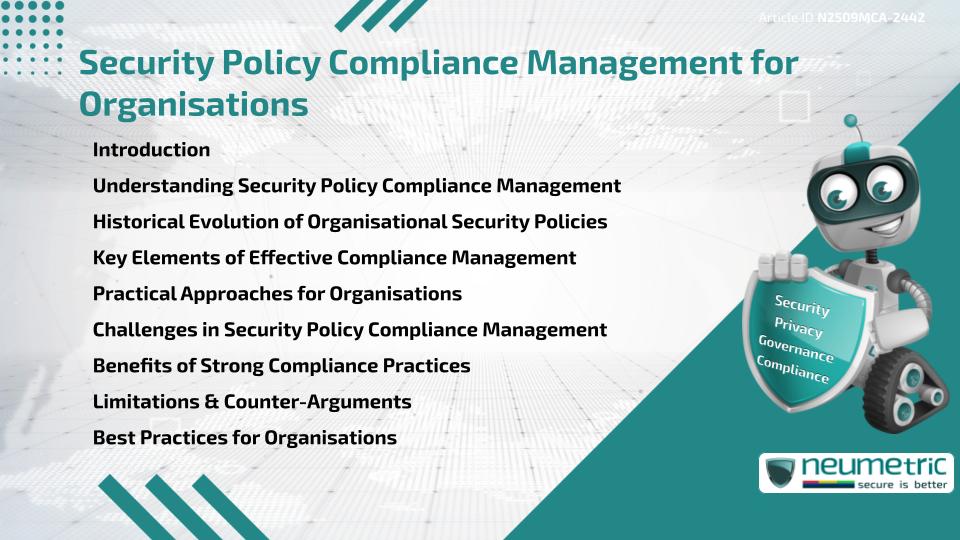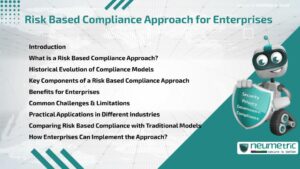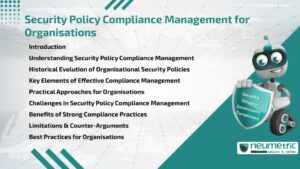Table of Contents
ToggleIntroduction
Security Policy Compliance Management is the process by which organisations ensure that their internal Policies align with Industry Standards, Regulatory requirements & Best Practices. It provides a structured way to safeguard Sensitive Data, maintain Accountability & reduce the Risks of security breaches. Without proper Compliance management, even the most well-crafted Security Policies remain ineffective.
This article explores the meaning, history, challenges, benefits & Best Practices of Security Policy Compliance Management. It highlights why it is a critical function for every organisation that values its information assets & reputation.
Understanding Security Policy Compliance Management
At its core, Security Policy Compliance Management ensures that Employees, Systems & Processes follow clearly defined security rules. These rules may be based on external regulations such as the General Data Protection Regulation [GDPR] or internal standards developed to protect Intellectual Property.
Think of it as a safety net in a construction site. Workers are instructed to wear helmets & harnesses, but the safety net below ensures that mistakes do not result in severe harm. Compliance management is that net which verifies & enforces adherence.
Historical Evolution of Organisational Security Policies
Security Policies are not new. In the twentieth century, companies relied on physical safeguards such as locked filing cabinets. With the rise of digital systems in the 1980s, organisations began developing formal Security Policies to address growing cyber Risks.
In the early 2000s, Global Standards such as ISO 27001 pushed companies toward structured Compliance frameworks. Today, almost every sector-from Healthcare to Finance integrates Compliance Management into its operations to meet both Legal & Ethical obligations.
Key Elements of Effective Compliance Management
For Security Policy Compliance Management to be effective, organisations must focus on:
- Clear Documentation: Policies should be written in plain language accessible to all Employees.
- Training & Awareness: Staff must understand not only what the Policies are but also why they exist.
- Monitoring & Auditing: Regular checks ensure ongoing adherence.
- Accountability: Assigning responsibility at every level prevents ambiguity.
- Corrective Actions: Mechanisms must exist to address non-Compliance.
Practical Approaches for Organisations
Organisations can adopt different methods to strengthen Compliance management. Internal Audits help detect weaknesses early. Automated tools can track policy adherence across networks. Regular workshops & scenario-based training reinforce the human aspect of Compliance.
For example, many organisations combine technical enforcement-such as access restrictions-with cultural reinforcement, like rewarding teams that demonstrate consistent Compliance. This balance between systems & people is vital for long-term success.
Challenges in Security Policy Compliance Management
Despite its importance, implementing Security Policy Compliance Management comes with obstacles. Policies may become outdated quickly in dynamic industries. Employees sometimes view Compliance as a burden rather than a necessity. Budget constraints limit the ability to invest in monitoring systems.
Additionally, overlapping regulations can create confusion. For multinational organisations, harmonising Policies across borders adds another layer of complexity.
Benefits of Strong Compliance Practices
When Security Policy Compliance Management is implemented effectively, the benefits are substantial:
- Risk Reduction: Fewer chances of Data breaches & Financial losses.
- Reputation Protection: Customers Trust organisations that demonstrate Accountability.
- Regulatory Alignment: Avoidance of fines & legal disputes.
- Operational Consistency: Standardised processes improve efficiency.
Limitations & Counter-Arguments
Some critics argue that Compliance-focused approaches may encourage organisations to meet only the minimum requirements. In this sense, Compliance does not always guarantee true Security. Others note that excessive monitoring may lead to Employee dissatisfaction or resistance.
These perspectives highlight the importance of balancing strict Compliance with a culture of trust & innovation.
Best Practices for Organisations
To strengthen their Security Policy Compliance Management, organisations should:
- Conduct regular Risk Assessments.
- Update Policies in response to new Threats.
- Promote open Communication around Compliance expectations.
- Integrate Compliance into daily workflows rather than treating it as a separate function.
- Leverage external benchmarks & peer reviews to stay current.
Takeaways
- Security Policy Compliance Management builds a culture of resilience.
- It reduces Risks & strengthens Trust with Stakeholders.
- Challenges exist, but benefits outweigh the drawbacks.
- Compliance should go beyond ticking boxes & aim for true effectiveness.
- Best Practices help turn Compliance into a strategic advantage.
FAQ
What is Security Policy Compliance Management?
It is the process of ensuring that organisational Security Policies align with laws, regulations & Best Practices while being consistently applied.
Why is Compliance management important for organisations?
It reduces Risks, prevents Legal issues, protects Reputations & ensures that Policies are effective in practice.
How does Compliance management differ from security management?
Security management focuses on protecting assets, while Compliance management ensures adherence to standards & regulations that support security.
What are common challenges in Compliance management?
Outdated Policies, budget constraints, Employee resistance & overlapping regulations are frequent obstacles.
Can small organisations benefit from Compliance management?
Yes, even small organisations face Risks & Legal requirements. Scaled-down frameworks can still improve Security & Trust.
Does Compliance guarantee full security?
No, Compliance sets minimum standards but does not eliminate all Risks. Organisations must go beyond Compliance for stronger protection.
How can Employees contribute to Compliance management?
By following Policies, reporting issues, participating in training & embracing a culture of Accountability.
Need help for Security, Privacy, Governance & VAPT?
Neumetric provides organisations the necessary help to achieve their Cybersecurity, Compliance, Governance, Privacy, Certifications & Pentesting needs.
Organisations & Businesses, specifically those which provide SaaS & AI Solutions in the Fintech, BFSI & other regulated sectors, usually need a Cybersecurity Partner for meeting & maintaining the ongoing Security & Privacy needs & requirements of their Enterprise Clients & Privacy conscious Customers.
SOC 2, ISO 27001, ISO 42001, NIST, HIPAA, HECVAT, EU GDPR are some of the Frameworks that are served by Fusion – a SaaS, multimodular, multitenant, centralised, automated, Cybersecurity & Compliance Management system.
Neumetric also provides Expert Services for technical security which covers VAPT for Web Applications, APIs, iOS & Android Mobile Apps, Security Testing for AWS & other Cloud Environments & Cloud Infrastructure & other similar scopes.
Reach out to us by Email or filling out the Contact Form…





